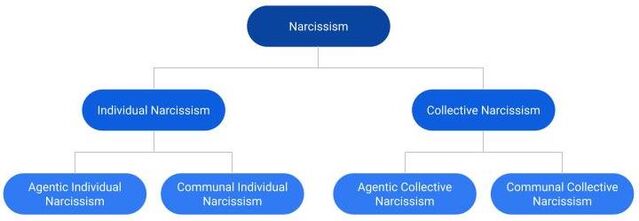Narcissism
The 4 Faces of Narcissism
New research validates a novel construct of collective narcissism.
Posted June 26, 2021 Reviewed by Vanessa Lancaster
Key points
- A new study validates a communal form of collective narcissism involving an inflated sense of ingroup contributions to society.
- Communal narcissists satisfy their narcissistic desire for superiority through recognition for their contribution to the community.
- Collective narcissists have an inflated sense of the importance and entitlement of their ingroup and show aggression toward outgroups.

Narcissism refers to an inflated sense of self-importance and entitlement, an excessive need for power, success, and admiration, and hypersensitivity to criticism.
Narcissism is not a homogenous concept, however. A narcissist's desire for power, success, and admiration can take the form of an inflated sense of how successful, powerful, or intelligent they are.
This form of narcissism is also known as agentic narcissism. Agentic narcissists tend to have diminished empathy for others and openly derogate those who don't admire them.
But a narcissist's desire for power, success, and admiration can also be realized in the form of an inflated sense of their contributions to the community. Thus, for example, narcissists might conceive of themselves as highly compassionate or generous or morally exemplary (Nehrlich et al., 2019).
Narcissism of this kind is also referred to as communal narcissism. Although communal narcissists also have diminished empathy for others, they may refrain from openly derogating others. Accordingly, they may come across as more empathetic toward others than agentic narcissists.
Agentic and communal narcissism belong to a form of narcissism known as individual narcissism, or what we often simply refer to as narcissism.
The third type of narcissism is collective narcissism (Golec de Zavala et al., 2009). The collective form of the condition refers to an inflated sense of the importance and entitlement of one's ingroup, resentment for the perceived lack of recognition of one's ingroup, and hypersensitivity to criticism of their ingroup.
Racists, for example, are collective narcissists, as they have an inflated sense of the importance and entitlement of white people, feel resentful for society's lack of recognition of their superiority, and exhibit hypersensitivity to criticism of their ingroup.
Racists are agentic collective narcissists, as they seek to realize their narcissistic desire for power, success, and admiration by gaining recognition as a member of their ingroup.
In a new study, psychologist Magdalena Żemojtel-Piotrowska et al. (2021) show that collective narcissism also can take a communal form that is conceptually and empirically distinct from agentic collective narcissism.
Żemojtel-Piotrowska et al. (2021) define communal collective narcissism as "strong ingroup identification, unrealistically positive beliefs about the ingroup's communal contribution, entitlement about the group's communal worth, and grievance for lack of ingroup recognition in the communal domain."

To test the validity of this construct, the team formulated a scale for communal collective narcissism based on their definition. The scale included questions such as "Members of my group are the most helpful people I know," "In the future, my group will be well-known for the good deeds it will have done," and "Very few other groups are as moral as mine."
Żemojtel-Piotrowska et al. then administered the scale to 856 participants aged 18-83 (439 women, 417 men; mean age = 42). To optimize the scale, they removed items that turned out to be empirically redundant or overlapped with items on the scales for agentic collective narcissism and individual communal narcissism. This resulted in a seven-item scale for communal collective narcissism.
The researchers then tested their seven-item scale against the scale for agentive collective narcissism, using the participant's view of their own country compared to other countries as a test scenario.
This study confirmed that the two collective narcissism scales, while interrelated, are empirically distinct. Agentic collective narcissists tended to focus on their ingroup's superior agentic attributes (e.g., "My group has a higher IQ than other groups"). In contrast, communal collective narcissists were more likely to focus on how their ingroup benefited the community (e.g., "My group always fights for the poor and oppressed").
In a third study, the team examined what incentivized communal collective narcissists to derogate outgroup members who threaten the ingroup's image.
The results showed that agentic collective narcissists derogated outgroup members who threatened the agentic virtues of their ingroup, for example, their intelligence.
Communal collective narcissists, by contrast, derogated outgroup members who threatened the communal virtues of their ingroup, for example, their compassion or helpfulness toward others.
In a fourth study, Żemojtel-Piotrowska et al. tested whether communal collective narcissism differed from agential collective narcissism regarding their attitudes toward outgroups who presented a perceived threat to the ingroup.
Here, the team found that, like their agentic counterparts, communal collective narcissists had genuine antisocial tendencies. For example, they showed a preference for military aggression and an unwillingness to forgive outgroups for a perceived insult to their ingroup.
References
Golec de Zavala, A., Cichocka, A., Eidelson, R., & Jayawickreme, N. (2009). Collective narcissism and its social consequences. Journal of Personality and Social Psychology, 97(6), 1074–1096.
Nehrlich, A. D., Gebauer, J. E., Sedikides, C., & Schoel, C. (2019). Agentic narcissism, communal narcissism, and prosociality. Journal of Personality and Social Psychology, 117(1), 142–165.
Żemojtel-Piotrowska, M., Piotrowski, J., Sedikides, C., Sawicki, A., Czarna, A.Z., Fatfouta, R., Baran, T. (2021). Communal collective narcissism, Journal of Personality. Online First. DOI: 10.1111/jopy.12636




